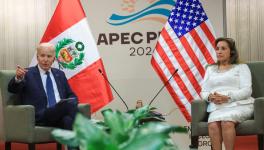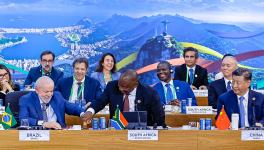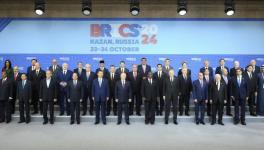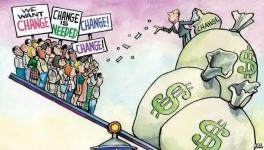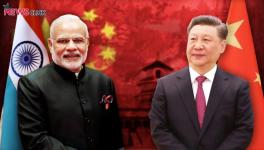Debating the Significance of the BRICS Bank
The BRICS Bank declared in Fortaleza by the BRICS countries has raised questions regarding its significance. Some -- such as Leo Panithch and Prabhat Patnaik -- have said that given the neoliberal direction of most of these countries, it is unlikely to make a major difference to the global economy. Fidel Castro has, .in his article written about the significance of the BRICS Bank, not in terms of its economic significance but its political importance in shifting away from the unipolar world dominated by the US.These are the twin challenges we face -- one of transforming the global economy as well as the national economies to a different path than the hyper capitalist path being followed today; the other, to break the global hegemony of the US and its allies. It is here that the global financial institutions shore up the US hegemony politically. For example, the choice Yanukovich faced in Ukraine to bail out the Ukraine economy was either the IMF or Russia. A BRICS bank would have given an alternate to the IMF. A Russian bail-out could be used by the Maidan forces to whip up Ukrainian nationalism against Russia.
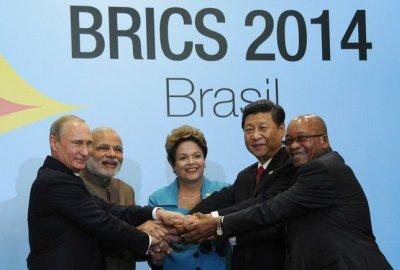
To bring out both sides of the debate, we are putting together a set of interviews and articles. We have Prabhat Patnaik's and Fidel Castro's articles here , along with two videos -- one in which Michael Hudson and Leo Panitch debate each other on the BRICS Bank on Real News, and an interview of Rajat Nag, a former Managing Director General of the Asian Development Bank with Newsclick.
The BRICS Bank- Prabhat Patnaik
ON July 15, the five BRICS countries, Brazil, Russia, India, China, and South Africa formally created a New Development Bank at Fortaleza, Brazil, which would be headquartered in Shanghai and would have an Indian as its first president. It would have a capital base of $50 billion to start with, contributed by the five governments, and would provide development funding to all governments for infrastructure projects. The BRICS proposal also envisages a Contingency Reserve Arrangement, of $100 billion, which will give loans to governments for tiding over balance of payments problems; but this arrangement is yet to get started.
Many economists and commentators have welcomed the BRICS Bank, each of them citing some mix of the following three arguments: first, it will increase the role of the BRICS countries in “global economic governance”. These countries are currently marginalised in the affairs of the main development lending agency, the World Bank, which operates on the principle of votes according to capital share, and not “one country one vote” (the principle that governs the UN); their economic weight will increase if they jointly have a development bank of their own that has the same objectives that the World Bank was originally supposed to fulfill when it was launched at Bretton Woods. (In another parallel to Bretton Woods, the CRA that is the twin organisation of the BRICS Bank but is yet to take off, is envisioned as fulfilling an IMF-type role). Put differently, the argument is that the BRICS Bank will reduce the clout of the developed countries in “global economic governance” and increase that of the BRICS, which is to be welcomed as it represents a devolution of global economic power.
The second argument is that it will increase the “weight of the South” in “global economic governance”. It is being claimed that the BRICS Bank will operate on the basis not of “votes according to capital share”, but of “one country one vote”, with no veto power given to any country; and in addition to the five countries who own the Bank, there will also be some other countries of the South, on a rotation basis, on the Board of the Bank who will be entitled to vote. Consequently, it will not just be a BRICS Bank but one representing in some ways the entire South.
The third argument is that the BRICS Bank will not be a source of ideological pressure for adopting neo-liberal policies, as the World Bank became. This argument states that the World Bank in the beginning used to give project assistance on the basis of the viability of the project itself, without interfering with the macroeconomic policies of the government in question. But at a certain point it started giving loans for government budget support, primarily under “Structural Adjustment” lending, but also under other facilities (the Extended Facility loan obtained by India in the early eighties being an example of this new kind of lending). It then began to concern itself with the macroeconomic policy orientation of the borrowing government. It put “conditionalities” on its loans, as the IMF too started doing, which essentially pushed the borrowing countries into adopting neo-liberal policies. Since the BRICS Bank will be giving project loans, based entirely on the viability of the project itself, it will be unconcerned with the macroeconomic orientation of the government; hence its loans will lack the ideological coercion that the World Bank’s loans bring with them.
What all these arguments essentially boil down to in terms of political economy is that the BRICS Bank will reduce the dependence of the South on institutions dominated by imperialism, and hence constitutes a progressive development. Is this a valid claim?
UNJUSTIFIED EUPHORIA
It is churlish of course to make pronouncements on the matter at such an early stage; but the euphoria of the commentators, one can safely say, is unjustified. The point is that even though China stands on a somewhat different footing, all the other BRICS countries have substantial domestic big bourgeoisies which are integrated with international finance capital. This is true even of Russia though it currently has a stand-off with the West over Ukraine. The question of the BRICS Bank cannot be analysed without reference to the big bourgeoisie of the BRICS countries, as the commentators have almost universally done. In other words the class nature of these regimes has a crucial bearing on the direction that the BRICS Bank will take: whether the BRICS Bank and the CRA will become mere replicas of the World Bank and the IMF with some delegation of authority from the “top” to the BRICS powers, or whether they will expand the elbow room of the countries of the South.
The fact that the CRA is reportedly considering imposing IMF-style “conditionalities” on all countries that borrow in excess of 30 percent of their quotas is indicative of the shape of things to come. And the World Bank certainly does not see the BRICS Bank as any sort of a rival; indeed it has welcomed the formation of the BRICS Bank in no uncertain terms.
It is no secret that the IMF and the World Bank have been declining organisations, with the bulk of international lending now being routed not through these multilateral agencies but through private banks. In fact in the aftermath of the 2008 financial crisis, the IMF was briefly resuscitated through a plan worked out by the G-20, of which several BRICS countries are members, that sought to use Chinese funds, routed through the IMF, for reviving crisis-hit economies. This plan, incidentally, of which India was a major architect, was meant to counter a proposal mooted by the then president of the UN General Assembly, Father Miguel Brockman of Nicaragua (who had set up the Stiglitz Commission), to have a new Bretton Woods-type international conference with participation by all UN member-States. Several BRICS countries in short had connived with the US-led imperialist bloc to sabotage a proposal to bring countries of the South to the forefront of “global economic governance”, and had even resuscitated a near-defunct IMF for this purpose. To imagine that the same countries are now going to stand with the South, through the BRICS Bank, to loosen the hold of imperialism, is utterly fanciful.
The relationship of the third world big bourgeoisie with imperialism does not remain invariant over time. There was a time, when Nehruvian dirigisme held sway, when the third world big bourgeoisie wanted a degree of relative autonomy from imperialism, to develop the “national economy”; and dirigisme reflected this ambition. But that came to an end a long time ago. Even in India, which held out the longest, it is two-and-a-half, if not three, decades since neo-liberalism has replaced dirigisme, which basically signifies the big bourgeoisie’s integration into the ranks of globalised finance capital, with its own ambitions of encroaching on other third world economies and reducing them to appendages, exactly the way imperialism does, but with the blessings of imperialism rather than in opposition to it.
India’s land grab in Africa is a case in point here, as is the spate of Free Trade Agreements being signed by the Indian government in which the interests of the peasants is being sacrificed in order to find markets for capitalist manufactures. The big bourgeoisies in other BRICS countries too are not free of such ambitions of making encroachments on other economies of the South. Hence, the idea that everything that emanates from within the ranks of third world countries is ipso facto a weakening force for imperialism has to be abandoned in today’s context.
To believe that the same Indian government which is attempting to privatise State-owned banks within India against the interests of its own people, on the spurious argument that it needs to meet Basle-III “capital adequacy norms”, is suddenly keen to develop a public sector BRICS Bank in the interests of the people of the South is to show extraordinary naivete.
LITTLE TO CHEER
This brings us to an important point. Why does any county need to borrow from an international bank for financing its infrastructure? The real resources needed for such investment are of two kinds: those available domestically and those which have to be imported. As far as the former are concerned, financing their purchase does not require an international loan; it can be done simply by borrowing from domestic banks, including the central bank. Since there is plenty of unutilised domestic capacity lying round in most large third world countries, such domestic borrowing will be non-inflationary and hence can be resorted to with impunity. It is only for obtaining the foreign exchange required for buying the imported component of the infrastructure investment, that a loan from an international bank may be required.
But this is not the way that finance capital looks at the issue and hence most third world governments who learn their economics from the spokesmen of finance. They think of resources not in real but exclusively in money terms; they believe that domestic credit expansion must be kept on a tight leash because of inflation as at present (even though this inflation is not caused by excess demand); and hence they see a virtue in substituting foreign loans for domestic ones. The expansion of foreign exchange availability that this entails encourages a substitution of imported for domestic inputs in infrastructure projects (this is sometimes insisted by foreign banks in the name of “floating global tender”). A BRICS Bank in short can play the role of expanding the market for the BRICS countries in the economies of the South at the expense of local manufacturers. “Neo-liberalism” no doubt already works in this direction; but a BRICS Bank will aggravate the tendency.
The easy availability of foreign exchange, even when it does not cause a substitution of imported for domestically-produced goods, and hence does not cause domestic “deindustrialisation”, has another similar effect: by financing a current account deficit, it prevents any corrective steps being taken to eliminate this deficit. It thereby exposes the country to a future foreign exchange crisis of an even bigger magnitude, and does so paradoxically by preventing any immediate tightness of foreign exchange. And when such a crisis of a bigger magnitude strikes, it is the people who pay the price for it, not the big bourgeoisie.
The moral of the story is this: the meaning of any financial arrangement, such as the setting up of an international development bank like the BRICS Bank, depends on the context. It has one meaning in a context where all nation-States freely impose trade and capital controls, and quite another meaning when they pursue neo-liberal policies. It can be a source of support for a regime attempting to break loose from the shackles of imperialism in the former context but not in the latter. As far as the people of the South, including India, are concerned, there is therefore little to cheer in the formation of the BRICS Bank.
Courtesy: People's Democracy
It is Time to Know a Little More about Realities- Fidel Castro
I have asked the editors of Granma to relieve me of the honor of publishing what I write on the front page of the official organ of our Party, since I am thinking of expressing personal points of view on issues which, for obvious reasons of health and time, I have not been able to present in the collective leadership bodies of the Party or state, such as Party Congresses or pertinent meetings of the National Assembly of People’s Power.
In our era, problems are increasingly more complex and news is produced at the speed of light, as many know. Nothing happens today in our world, which does not teach something to those of us who wish, and are still able, to understand new realities. The human being is a strange mixture of blind instinct, on one hand, and conscience, on the other.
We are political animals, as, not without reason, affirmed Aristotle, who perhaps influenced humanity’s thinking more than any other ancient philosopher through his almost 200 treatises, according to reports, of which only 31 have been preserved. His teacher was Plato, who left for posterity his famous utopia about the ideal state, which in Syracuse, where he tried to apply it, almost cost him his life. His Political Theory has endured as a designation used to describe ideas as good or bad. Reactionaries often describe both Marx and Lenin as theorists, without taking into consideration that their utopias inspired Russia and China, the two countries called upon to lead a new world which will allow for human survival, if imperialism does not first unleash a criminal, exterminating war.
The Soviet Union, the socialist camp, the People’s Republic of China and North Korea helped us resist, with essential supplies and weapons, the implacable blockade of the United States, the most powerful empire ever to exist. Despite its immense power, it has not been able to squash the small country which has, a few miles off its coasts, for more than half a century, withstood its threats, pirate attacks, the hijacking of fishing boats and sinking of merchant ships, the in-flight destruction of a Cubana Airlines airplane over Barbados, the burning of schools and other similar misdeeds. When it attempted to invade our country with mercenary forces in the vanguard, transported by U.S. warships as the first wave, it was defeated in less than 72 hours. Later, counterrevolutionary bands organized and equipped by the U.S. committed acts of vandalism which led to loss of life and injury to thousands of compatriots.
The largest base of operations for activities against our country, which existed at that time, was located in the state of Florida. Over the course of time, the economic blockade was extended to other NATO countries and other Latin American allies, who during those first years were accomplices to the empire’s criminal policy which lacerated the dreams of Bolívar, Martí and hundreds of other great patriots of irrepressible revolutionary conduct in Latin America.
Our small country was not only denied our right to be an independent nation, like any other among the many in Latin America and the Caribbean, exploited and sacked by them. On the contrary our homeland’s right to independence would be stripped, and manifest destiny would fulfill its task of annexing our island as part of the United States of America’s territory.
During the recently concluded meeting in Fortaleza, an important declaration was approved by the countries which comprise the BRICS group. The BRICS propose greater macroeconomic coordination among the principal economies, in particular the G-20, as a factor fundamental to the strengthening of prospects for effective and sustainable recovery around the world. They announced the signing of an accord to constitute the New Development Bank with the goal of mobilizing resources for infrastructure projects and sustainable development in BRICS countries, and others which are emerging or developing.
The bank will have an initial authorized capital of 100 billion dollars. The initial capital agreed upon will be 50 billion dollars, in equal parts from the founding members. The first president of the Board of Governors will be Russia. The first president of the Administrative Council will be Brazil. The first president of the Bank will be India. The Bank headquarters will be in Shanghai.
They also announced the signing of a treaty to establish a common currency reserves fund for contingencies, with an initial size of 100 billion dollars. Support was reaffirmed for a multilateral system of open, transparent, inclusive, non-discriminatory trade; as well as for the successful conclusion of the World Trade Organization’s (WTO) Doha Round.
They recognize the important role which state enterprises play in the economy, as well as small and medium sized companies, as creators of employment and wealth. They reaffirm the need for comprehensive reform of the United Nations, including its Security Council, with the goal of making it more representative, effective and efficient, so that it can respond appropriately to global challenges.
They reiterated condemnation of terrorism in all its forms and manifestations, wherever it might occur, and expressed their concern about the continuing threat of terrorism and extremism in Syria, while at the same time called upon all Syrian parties to commit to putting an end to terrorist acts perpetrated by Al-Qaeda, their affiliates and other terrorist organizations. They strongly condemned the use of chemical weapons under any circumstances, and welcomed the decision by the Arab Republic of Syria to adhere to the Convention on Chemical Weapons.
They reaffirmed their commitment to contribute to a just and lasting global solution to the Arab-Israeli conflict, based on the universally recognized legal framework, which includes pertinent United Nations resolutions, the Madrid principles and the Arab Peace Initiative, and expressed support for the convocation, as soon as possible, of a conference to establish a zone free of nuclear weapons and other weapons of mass destruction in the Middle East.
They reaffirmed their desire that the exploration and utilization of outer space be for peaceful purposes. They reiterated that there is no alternative to a negotiated solution to the Iranian nuclear question, and reaffirmed their support for its solution via political and diplomatic channels. They expressed concern for the situation in Iraq, and supported the Iraqi government in its efforts to overcome the crisis, defend its national sovereignty and territorial integrity. They expressed concern for the situation in Ukraine and issued a call for broad dialogue, abatement of the conflict, and moderation on the part of all parties involved, with the goal of finding a peaceful political solution.
They reiterated their firm condemnation of terrorism in all its forms and manifestations and pointed out that the United Nations has a central role to play in the coordination of international action against terrorism, which must be conducted in accordance with international law, including the United Nations Charter, and with respect for human rights and fundamental liberties.
They recognized that climate change is one of the greatest challenges confronting humanity, and issued a call to all countries to act on the decisions adopted by the United Nations Framework Convention on Climate Change (UNFCCC), looking to reach, by 2015, a successful conclusion of the negotiations to develop a protocol, another legal instrument or an agreed-upon document with legal force under the Convention, applicable to all parties, in accordance with the principles and dispositions of the UNFCCC, in particular the principle of common responsibility, although differentiated and in accordance with respective capacities.
They affirmed the strategic importance of education for sustainable development and inclusive economic growth, and emphasized the links between culture and sustainable development.
The next BRICS Summit will be held in Russia, in July, 2015. It might seem that this is but one more agreement among the many constantly appearing in cables released by the major Western news agencies. Nevertheless, the meaning is clear and emphatic: Latin America is the geographic area in the world where the United States has imposed the most unequal system on the planet, enjoying of its internal riches, a supply of cheap raw materials, a market for its merchandise, and has been the recipient of its gold and funds which escape their respective countries and are invested by U.S. companies in the country, or any other place in the world.
No one has ever found a response to satisfy the demands of the existent market we know today, although no one can doubt that humanity is moving toward a stage which will be more just than the human society we have known to date. The abuses committed throughout history are repugnant. Today what is valued is what will happen on our globalized planet in the near future.
How can human beings escape the ignorance, the lack for basic resources for food, heath, education, housing, dignified employment, security and fair compensation. What is most important, must be this or not possible, in this miniscule corner of the universe. If meditating on this is of any use, it is to guarantee in reality the supremacy of human beings.
On my part, I do not have the slightest doubt that when President Xi Jinping completes the activities in his tour of this hemisphere, as did Vladímir Putin, President of the Russian Federation, both countries will be culminating one of the greatest feats of human history.
The BRICS statement approved July 15, 2014 in Fortaleza advocates for greater participation by other countries, especially those struggling for their development, with a view toward promoting cooperation and solidarity with the peoples, and specifically with those of South America, pointing out in a significant paragraph that the BRICS particularly recognize the importance of the South American Union (Unasur) in the promotion of peace and democracy regionally, in the achievement of sustainable development, and the eradication of poverty.
I have already been extensive enough, despite the fact that the range and importance of the issue demand analysis of important questions which require some response. I thought that in subsequent days there would have been a little more serious analysis of the importance of the BRICS Summit. It would be enough to add up the inhabitants of Brazil, Russia, India, China and South Africa to understand that, at this time, they amount to half of the world’s population. In a few decades, China’s Gross Domestic Product will surpass that of the United States. Many states are already requesting yuan and not dollars, not only Brazil, but several of the most important in Latin America, whose products like soy and corn compete with those of the United States. The contribution which Russia and China can make to science, technology and the economic development of South America and the Caribbean is decisive.
The great events of history are not forged in a day. Enormous tests and challenges of increasing complexity are on the horizon. Between China and Venezuela, 38 agreements were signed. It is time to know a little more about realities.
Courtesy: Granma.cu
Disclaimer: The views expressed here are the author's personal views, and do not necessarily represent the views of Newsclick.
Get the latest reports & analysis with people's perspective on Protests, movements & deep analytical videos, discussions of the current affairs in your Telegram app. Subscribe to NewsClick's Telegram channel & get Real-Time updates on stories, as they get published on our website.











